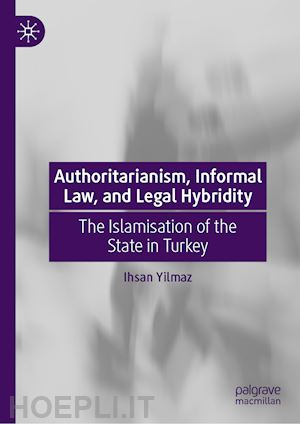

Questo prodotto usufruisce delle SPEDIZIONI GRATIS
selezionando l'opzione Corriere Veloce in fase di ordine.
Pagabile anche con Carta della cultura giovani e del merito, 18App Bonus Cultura e Carta del Docente
This book investigates Turkey’s departure from a ‘flawed democracy’ under Kemalist secularism, and its transitioning into Islamist authoritarian Erdoganism, through the lenses of informal law, legal pluralism, and legal hybridity. In doing so, it examines the attempts of Turkey’s ruling party (AKP) at social engineering and gradual Islamisation of the Turkish state and society, by using informal Islamist laws.
To that end, the book argues that the AKP has paved the way for Islamist legal hybridity where society, state, and law, are being gradually Islamised on an ad hoc basis. Informal law and legal pluralism in Turkey have had a non-state characteristic which have permitted Muslims to solve disputes by seeking the opinions of religio-legal scholars. Yet under the AKP rule, this informal legal system has become increasingly dominated by conservatives, sometimes radical Islamists, which the governing party has taken advantage of by either formalizing some partsof the informal Islamist law, or using it informally to mobilize its supporters against the opposition.
Chapter 1: Informal Institutions, Unoffical Laws and Legal Hybridity in Turkey.- Chapter 2: Informal Laws, Islamist Legal Hybridity and Its Producers.- Chapter 3: Towards an Islamist Hybrid Family Law.- Chapter 4: Sharia, Legal Hybridity, and Islamization of Social Life.- Chapter 5: Islamist Legal Hybridity on Economy.- Chapter 6: Islamist Informal Laws on Corruption.- Chapter 7: Islamist Legal Hybridity on Government and Opposition.- Chapter 8: Authoritarianism, Informal Law, and Legal Hybridity.
Ihsan Yilmaz is Research Professor and Chair at the Alfred Deakin Institute for Citizenship and Globalisation, Deakin University, Melbourne, Australia. He has conducted mixed method research on authoritarianism, legal pluralism, nation-building, citizenship, Islam–state–law relations in majority and minority contexts (Turkey, Pakistan, Egypt, Indonesia, UK, USA and Australia), Islamism, populism, transnationalism, ethnoreligious and political minorities, securitisation, and intergroup relations. He was Professor of Political Science at Istanbul Fatih University (2008–2016), Lecturer in Law, Social Sciences and Politics at SOAS, University of London (2001–2008), and a fellow at Centre for Islamic Studies, the University of Oxford (1999–2001).











Il sito utilizza cookie ed altri strumenti di tracciamento che raccolgono informazioni dal dispositivo dell’utente. Oltre ai cookie tecnici ed analitici aggregati, strettamente necessari per il funzionamento di questo sito web, previo consenso dell’utente possono essere installati cookie di profilazione e marketing e cookie dei social media. Cliccando su “Accetto tutti i cookie” saranno attivate tutte le categorie di cookie. Per accettare solo deterninate categorie di cookie, cliccare invece su “Impostazioni cookie”. Chiudendo il banner o continuando a navigare saranno installati solo cookie tecnici. Per maggiori dettagli, consultare la Cookie Policy.